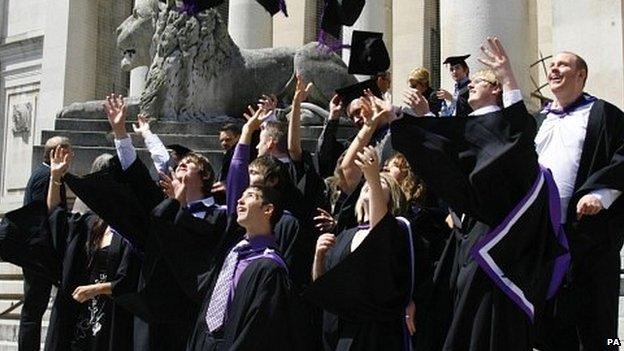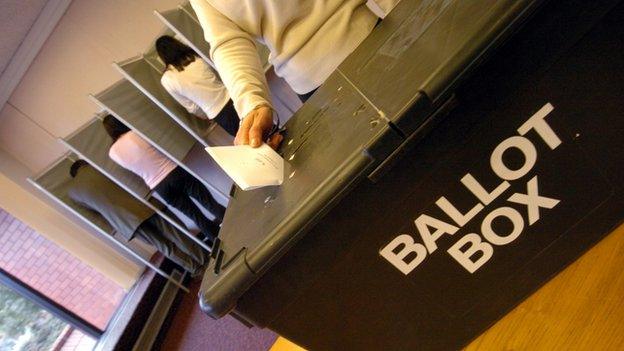Labour attacks missing voters 'scandal'
- Published
- comments
Ed Miliband: "This is David Cameron and Nick Clegg's final insult to young people"
Almost one million voters are "missing" from the electoral register in England and Wales, Ed Miliband has said.
In a speech in Sheffield, the Labour leader blamed the "hasty" introduction of the new system of individual voter registration for the problem, saying students were particularly affected.
People must now register to vote individually rather than one member of a household filling in a form.
Ministers said 90% of voters had moved automatically to the new system.
Mr Miliband told students at Sheffield Hallam University that the number of young people not registered to vote was a "scandal".
'Warnings ignored'
Labour said 307 of 373 local authorities that provided data had recorded a reduction in their electoral roll. Overall, there had been a reduction of 950,845, the party said.
Labour has claimed the number of people registered to vote has fallen sharply in many university towns, blaming in part changes which mean universities and colleges can no longer block-register students living in halls of residence to vote.

Labour says students have been disproportionately affected
The Labour leader accused David Cameron and Nick Clegg of "sitting by and watching hundreds of thousands of young people in our country lose their sacred democratic rights".
"This is a direct consequence of the government's decision to ignore warnings that rushing through new individual registration reforms would damage democracy," he said. "It has.
"We will not allow this scandal to happen and no right-thinking person should either."
Labour, Mr Miliband added, would now lead "a national mission" to stop young people "being denied a voice" at the election.
The party said it would be deploying some of its full-time staff to university towns to try to get more students to register before the 20 April deadline, after which people will not be able to register to vote in the election.
'Proceeding to plan'
The government said 4.5 million people had applied to register since the new system came into place in June and it was spending £14m this year on national and local initiatives to "maximise" voter registration before 7 May.
The Cabinet Office said it was "premature" to say how many students were registered as the last update was in December and there was "insufficient time" between enrolment in September and the end of the year to "capture" up-to-date figures.
"Individual Electoral Registration has replaced the outdated head of household voter registration system and is both increasing the accuracy of the register and giving people more control and ownership over the process," a spokesman said.
"Things are proceeding to plan and nearly 90% of electors have been automatically transferred to the new system without having to do anything. Everyone else is being contacted directly and encouraged to use the new convenient online registration system."
And the Liberal Democrats accused Labour of "scaremongering".
"Labour must have forgotten they began the policy of individual electoral registration while they were in government, and still support it in principle," Tom Brake, deputy leader of the House of Commons, said.
He added: "Labour also seem keen to hide the fact that the coalition government has made it extremely easy to register to vote - it can be done online in a couple of minutes."
Registration drive
The Electoral Commission has said the move to individual voter registration will "lead to a more secure electoral register".
According to the election watchdog, about 30% of 18 to 24-year-olds are currently not registered to vote compared with fewer than 5% of those aged over 65.
It launched its own student voter registration drive earlier this week in conjunction with the National Union of Students, Universities UK and the Association of Colleges.
They are urging universities and colleges to ensure students are registered by the April deadline by reminding people that they can register online, holding registration sessions at the beginning of seminars and displaying posters in college buildings.
"Universities, colleges and other academic institutions are in a unique position to directly contact their students as part of this voter registration drive," said Jenny Watson, who chairs the commission.
"We hope that as many academic institutions as possible will support our efforts to get students registered."
- Published21 October 2014
